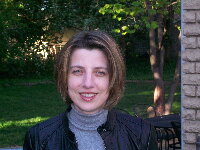
Research Areas
Biography
Stephanie Hilger is a scholar of eighteenth-century literature and culture, with a focus on gender studies and medical humanities. She is Professor of German and Comparative Literature. In addition, she holds appointments in the European Union Center, French, and Gender and Women’s Studies. Since 2021, she has also been affiliated with the Department of Biomedical and Translational Sciences at the Carle Illinois College of Medicine, where she regularly teaches a course in the medical humanities.
Her interest in the intersection of the humanities and medicine is represented in her two most recent publications. Her monograph, Medicalizing Difference: The Eighteenth-Century Construction of the “Hermaphrodite” (2024) reads eighteenth-century medical case histories against the grain to demonstrate that, rather than describing a fact, these texts created their object of study. Her edited collection, The Health Humanities in German Studies (2024), is the first full-length study to bring together these two fields; it surveys current critical terrain and explores further directions. Her current project, titled “Bodies of Knowledge: Eighteenth-Century Medicine as a Humanistic Interdiscipline,” demonstrates how medicine of the time simultaneously drew on areas that are now labeled as either scientific or humanistic.
Professor Hilger’s previous books, Gender and Genre: German Women Write the French Revolution (2014) and Women Write Back: Strategies of Response and the Dynamics of European Literary Culture, 1790 1805 (2009), also investigate eighteenth-century discourses regarding the body and gender. In addition to these monographs, Professor Hilger has (co-)edited three volumes in the medical humanities: Bodies and Transitions in the Health Humanities: Intelligible States of Corporeality (with Lisa DeTora, 2019); New Directions in Literature and Medicine Studies (2017); and The Early History of Embodied Cognition from 1740 to 1920 (with John McCarthy, Nicholas Saul, and Heather Sullivan, 2015).
In 2019, Professor Hilger was awarded a grant for “The Art of Medicine: A Public Square on Health and Medicine for the Illinois System” from the Presidential Initiative to Celebrate the Impact of the Arts and the Humanities at Illinois for curriculum development, research activities, and public outreach. Professor Hilger has also been the recipient of fellowships from the Program of Faculty Study in a Second Discipline, which allowed her to study embryology, the Humanities Research Institute, and the Center for Advanced Study.
In addition to several teaching awards from the College of Liberal Arts and Sciences, Professor Hilger was recognized as the 2017 Medical Scholars Program Advisory Committee Outstanding Advisor of the Year.
Awards and Honors
Presidential Initiative to Celebrate the Impact of the Arts and the Humanities Award for “The Art of Medicine: A Public Square on Health and Medicine for the Illinois System.”
2017 Medical Scholars Program Advisory Committee (UIUC) Outstanding Advisor of the Year.
Liberal Arts and Sciences Faculty Fellowship for Study in a Second Discipline for book project, “Liminal Bodies: Intersexuality in Literary and Medical Discourse,” Spring 2013.
Faculty Fellowship from the Illinois Program for Research in the Humanities, 2011-2012
Katholieke Universiteit Leuven/University of Illinois Faculty Exchange Award, Summer 2009
Faculty Fellowship from the Center for Advanced Study, 2008 and 2019
College of Liberal Arts and Sciences Lynn Martin Award for Distinguished Women Teachers, 2011-2012
Recipient of the 2016 Goethe Society of North America Essay Prize for “Orientation and Supplementation: Locating the "Hermaphrodite" in the Encyclopédie.”
Courses Taught
GER 573: Eighteenth-Century Studies: Democracy, Dialogue and Dissent
CWL 201: Comparative Literary Studies, I
CWL 241: Literature of Europe and the Americas, Part I
CWL 450/ENG 461/GWS 450: Gender Benders
CWL 471/GWS 490: Love, Lust, and Language: Women in the Eighteenth Century
CWL 581: Seductive Violence in the Eighteenth Century: Libertines, Murderers, and Revolutionaries
GCL: Doctors and Patients
CWL 581: Gendered Bodies in Literature and Medicine
Additional Campus Affiliations
Professor, Germanic Languages and Literatures
Professor, Program in Comparative and World Literature
Professor, French and Italian
Professor, Gender and Women's Studies
Professor, Biomedical and Translational Sciences
Professor, Center for Global Studies
Highlighted Publications
Hilger, S. M. (2009). Women Write Back: Strategies of Response and the Dynamics of European Literary Culture, 1790-1805. (Internationale Forschungen zur Allgemeinen und Vergleichenden Literaturwissenschaft; Vol. 124). Brill. https://doi.org/10.1163/9789042029057
Hilger, S. M. (Ed.) (2017). New Directions in Literature and Medicine Studies. Palgrave Macmillan. https://doi.org/10.1057/978-1-137-51988-7
McCarthy, J. A., Hilger, S. M., Sullivan, H. I., & Saul, N. (2016). The Early History of Embodied Cognition 1740-1920: The Lebenskraft-Debate and Radical Reality in German Science, Music, and Literature. Brill. https://doi.org/10.1163/9789004309036
Recent Publications
Hilger, S. M. (2024). INTRODUCTION: Intersections: Health Humanities and German Studies. In The Health Humanities in German Studies (pp. 1-20). Bloomsbury Publishing Plc..
Hilger, S. M. (2024). Medicalizing difference: The eighteenth-century construction of the "hermaphrodite". Bloomsbury Publishing Plc. https://doi.org/10.5040/9781350374959
Hilger, S. M. (2024). The Health Humanities in German Studies. Bloomsbury Publishing Plc. https://doi.org/10.5040/9781350296220
Hilger, S. M. (2023). Foreword. Sustainable Development Goals Series, Part F2814, v-viii.
Hilger, S. M. (2020). Enlightenment Angst: James Parsons' A Mechanical and Critical Enquiry into the Nature of Hermaphrodites. In N. Bachleitner, A. Hölter, & J. A. McCarthy (Eds.), Taking Stock-Twenty-Five Years of Comparative Literary Research (pp. 247-269). (Internationale Forschungen zur Allgemeinen und Vergleichenden Literaturwissenschaft; Vol. 200). Brill. https://doi.org/10.1163/9789004410350_010